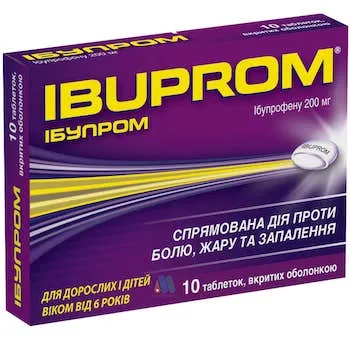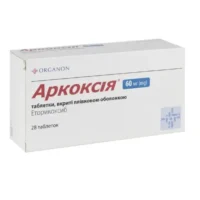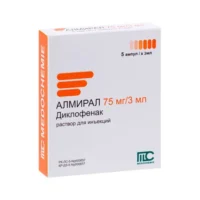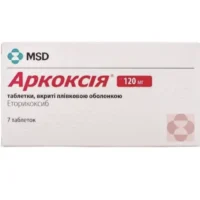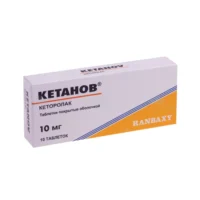Description
Ibuprom Coated Tablets 200 mg. №10
Ingredients:
Each coated tablet contains 200 mg of ibuprofen as the active ingredient. Other ingredients include lactose monohydrate, maize starch, colloidal anhydrous silica, povidone, croscarmellose sodium, stearic acid, talc, and Opadry Y-1-7000.
Mechanism of Action:
Ibuprofen works as a nonsteroidal anti-inflammatory drug (NSAID) by inhibiting the enzyme cyclooxygenase (COX). By blocking COX, ibuprofen reduces the production of prostaglandins, which are responsible for pain, inflammation, and fever in the body.
Pharmacological Properties:
Ibuprom coated tablets exhibit analgesic, anti-inflammatory, and antipyretic properties. The active ingredient, ibuprofen, acts by inhibiting prostaglandin synthesis through COX inhibition, leading to pain relief, reduced inflammation, and fever reduction.
Indications for Use:
Ibuprom coated tablets are indicated for the relief of mild to moderate pain, inflammation, and fever. They are commonly used for conditions such as headache, toothache, menstrual cramps, muscle aches, and arthritis.
Contraindications:
Do not use Ibuprom coated tablets if you have a history of allergic reactions to ibuprofen or other NSAIDs. Avoid use in individuals with active peptic ulcers, severe liver or kidney disease, and during the third trimester of pregnancy.
Side Effects:
Common side effects of Ibuprom coated tablets may include gastrointestinal disturbances, such as stomach pain, heartburn, and nausea. In some cases, ibuprofen can cause allergic reactions, skin rashes, and dizziness. Prolonged use or exceeding the recommended dosage may lead to more severe adverse effects.
Usage Instructions:
The recommended dosage for adults and children over 12 years old is 1-2 tablets every 4-6 hours as needed. It is advised not to exceed 6 tablets in 24 hours unless directed by a healthcare provider. Swallow the tablets whole with a glass of water, and do not crush or chew them. Taking the tablets with food or milk can help reduce the risk of stomach upset.
Benefits Compared to Analogues:
Ibuprom coated tablets offer effective relief from pain, inflammation, and fever with a lower risk of gastrointestinal irritation compared to some other NSAIDs. The special coating of Ibuprom tablets helps protect the stomach lining, making them suitable for long-term use in chronic conditions like arthritis.
Suitable Patient Groups:
Ibuprom coated tablets are generally safe for use in adults and children over 12 years old. However, special caution should be taken in elderly patients, individuals with existing gastrointestinal issues, and those with a history of cardiovascular conditions. Consult a healthcare professional before use in these populations.
Storage and Shelf Life:
Store Ibuprom coated tablets in a cool, dry place away from direct sunlight. Keep the tablets in their original packaging to protect them from moisture. Check the expiration date on the packaging, and do not use the tablets beyond the stated shelf life.
Packaging Description:
Ibuprom coated tablets are typically packaged in blister packs to ensure individual tablet integrity and protection from external factors. The packaging is designed to maintain the quality and efficacy of the tablets throughout their shelf life.

